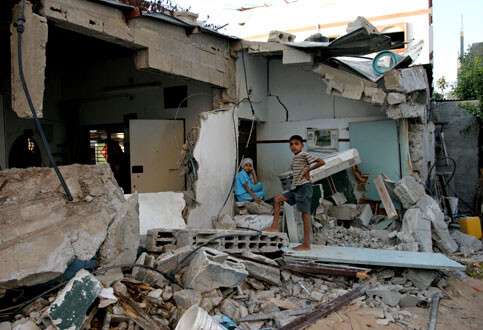UN Office for the Coordination of Humanitarian Affairs 18 July 2006

Palestinians inspect the ruins of their house which was attacked by Israeli forces in the northern Gaza Strip. Photo taken 18 July 2006. (MaanImages/Wesam Saleh)
Key developments since the last report on 12 July [1]:
Context Analysis:
The humanitarian situation continues to deteriorate in the Gaza Strip due to shortages of electricity and water, caused by the 28 June bombing by the Israel Air Force (IAF) of the Gazan power plant. Electricity supply to households and institutions remains severely depleted. Gazans are receiving on average, 6 – 8 hours of electricity per day and for most families living in urban areas 2 – 3 hours of water per day.
Palestinian Authority (PA) national and municipal services which have been financially struggling since the withholding of VAT transfers by the Government of Israel and the cutting of assistance by western donors, are unable to provide essential services to the population on the regular basis required. IAF air strikes continue to target PA institutions in the Gaza Strip. Gaza’s high poverty (79% of households are living under the poverty [2]) and unemployment (40% [3]) levels have sharply limited households’ ability to buy supplies, fuel and water.
Developments in detail:
Military incursions
Electricity
Fuel
water wells. The ICRC distributed a total of 57,000 litres of fuel to CMWU between 13 and 17 July.
Water and sanitation
Health
Food
Shelter and land
Coordination
Footnotes:
[1] This is the seventh Situation Report issued by OCHA in the June/July 2006 period. The previous reports were published on 21, 27, 30 of June and 4, 6 and 12 July and are available on www.ochaopt.org.
[2] IUED Palestinian Public Perceptions Poll No. 10. The poverty line for the reference household (two adults and four children) is $2.70/day as calculated by PCBS.
[3] PCBS Labour Force Survey, Q1 2006.
[4] 4 An agreement has been reached for fuel to be provided to the CMWU through the TIM for the next six months and discussions continue in relation to covering the costs of spare parts. Three fuel depots will be established in north, central and southern Gaza and will have a capacity of 450,000 litres.
[5] The CMWU has acknowledged the success of the recent coordination of supplies facilitated on its behalf by the World Bank with the Israeli DCL at Erez.
Related Links